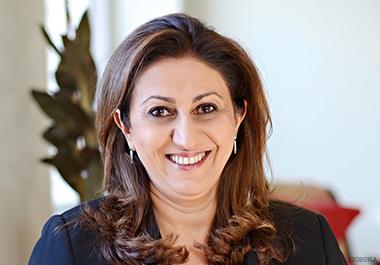Motivated by One’s Cancer Diagnosis: Dr. Fariba Behbod

The AACR-Breast Cancer Research Foundation (BCRF) for Translational Breast Cancer Research encouraged and supported a scientist to conduct breast cancer research and to establish a successful career path in this field. Fariba Behbod, Pharm D, PhD, received this award in 2014, when she was an Assistant Professor of Pathology and Laboratory Medicine at the Kansas University Medical Center (KUMC) Research Institute. Her AACR-BCRF project focused on the role of BCL9 in progression of ductal carcinoma in situ (DCIS) to invasive breast cancer. DCIS, often considered the stage 0 of breast cancer, is a proliferation of abnormal, but noninvasive, cells within the ductolobular system of the breast. Dr. Behbod is now a Full Professor in the Division of Cancer and Developmental Biology within the Department of Pathology and Laboratory Medicine and a full member of the Cancer Research Institute at the KUMC.
Dr. Behbod shares how AACR support has impacted her research and career and reflects on the future of human DCIS research.
What has motivated you to pursue DCIS as the focus of your research? Since you received the AACR-Breast Cancer Research Foundation grant in 2014, what advances have been made in the field in terms of research, diagnosis, treatment, and patient care?
Towards the end of my postdoctoral training, I was diagnosed with DCIS. This motivated me to initiate a collaboration with Drs. Daniel Medina and A. Craig Allred, both longtime collaborators of my postdoctoral mentor, Dr. Jeffrey M. Rosen, and world-renowned experts in breast premalignancy. At the time, animal models for studying DCIS progression were not available. This collaboration led to the development of the first model of human DCIS progression referred to as Mouse-INtraDuctal (MIND). Today, MIND is the most realistic model for studying not only DCIS progression but also breast cancer metastasis.

How important to you, at that stage of your career, was the award? Did it allow you to do things you might not otherwise have done? What has been the impact of your AACR-BCRF Award on your career (for example, what additional funding you have received, were researchers interested in collaborating with you/working in your laboratory, any new clinical trial etc.)?
The award enabled me to demonstrate that the MIND model can be used to follow the natural progression of patient-derived DCIS cells in mice. The model has now gained international recognition. In addition, it provided opportunities for me to collaborate with scientists worldwide. For example, I was asked to join PRECISION. PRECISION is an international effort aiming to establish tests to reduce the burden of unnecessary surgery, radiation and hormone-blocking therapies used in managing DCIS — reducing overtreatment. I helped the group establish the model for their studies aimed at understanding the mechanisms by which some DCIS remain indolent while others progress and become aggressive.
How have the findings from your AACR – BCRF Award impacted your research, the field of DCIS research, and patient care?
We received additional NIH funding to improve the translation application of the model by humanizing the immune system and the stroma. Furthermore, we have received an NCI PREVENT Concept Award for testing the efficacy of rosemary extract for breast cancer prevention. We are currently completing the pre-clinical studies. If successful, rosemary extract may be the first chemopreventive agent to be used for both HR+ and HR- breast cancers.
Since its inception, the AACR grants program has contributed to the development of new and improved approaches to cancer diagnosis, treatment, and cure. What is your vision for the future of DCIS research? What areas of DCIS research need more funding?
Women who are diagnosed with DCIS are three times more likely to die from breast cancer relative to women in the general population without a breast cancer diagnosis, including DCIS. Black women diagnosed with DCIS have a 7.6-fold increased risk of dying from breast cancer. Therefore, we need to develop new methods to identify patients who would be at the highest risk of dying from breast cancer after a DCIS diagnosis. We are still missing definitive predictive tools to identify those patients at risk for developing metastatic breast cancer following a DCIS diagnosis.
Dr. Behbod will be speaking at a Plenary Session focused on Model Systems at the upcoming AACR Special Conference “Rethinking DCIS: An Opportunity for Prevention” that is scheduled to be held in Philadelphia on September 8-11, 2022.